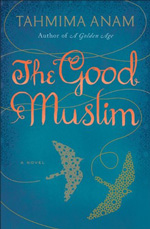
This brilliant novel about the Bangladeshi independence movement, its aftermath, and the subsequent Islamic movement is one of my ten favorite novels of 2011. It is centered around the relationship of two siblings, each of whom made significant decisions before and after the war of independence that affected their individual lives, their close relationship with each other, and the fates of those closest to them.
The novel begins in 1971, just after Bangladesh, formerly known as East Pakistan, has triumphed over West Pakistan in the Bangladesh Liberation War. Sohail Haque is a young soldier in the freedom movement who is returning to his family's home in the Bangladeshi capital of Dhaka. He travels alone, and while seeking shelter he makes a startling discovery that disturbs and transforms him. Weeks later he is greeted joyously by his mother Rehana and his sister Maya, who had feared the worst. Sohail is glad to be back home, but is reluctant to talk about details of the war, and he refuses to tell them the reason for his tardy return to Dhaka.
Sohail, a political activist at his university before the war, was imprisoned and brutally tortured by the Pakistani Army in his student days. During his long mental and physical recovery at home upon his release he takes solace in the Koran verses that his mother reads to him, and he soon embraces the Muslim faith. Unlike his sister, who is diligently studying for her medical degree, Sohail was an indifferent student, and he abandons his studies at the end of the war to become a religious leader. He marries a young widow who lives nearby, and they occupy the top floor of his mother's house, converting it into a center of worship.
Maya leaves home shortly afterward due to a family argument. She completes her medical degree and finds work as an OB-GYN in a small distant town. Years later, she receives word that her brother's wife has died, while her life is simultaneously threatened by men in the small town, and she returns to Dhaka for the first time since she originally left. She moves back home with her mother, but is soon dismayed by her brother's religious activities, including his abandonment of his young son Zaid to the streets. Maya embraces Zaid as if he were her own child, and the two siblings vehemently disagree about his upbringing, and their different views of religion and responsibility to family and society. Although they maintain their love for each other, their positions harden, which leads to tragedy.
The Good Muslim is a superb and exquisitely crafted novel, with fascinating and compelling characters and
subplots, set in a country that struggles to form an identity after gaining its independence. It was included amongst
the best novels of 2011 by The New Yorker, and has been longlisted for this year's Man Asian Literary Prize; despite
the presence of other novels by heavyweight authors such as Haruki Murakami and Amitav Ghosh on the longlist,
The Good Muslim would be an excellent choice for the award. The author's first novel, The Golden Age,
won the Commonwealth Writers' Prize for Best First Book in 2008 and was shortlisted for two other major literary
awards that year. Tahmima Anam is a major talent who is worthy of greater recognition, and I eagerly await
her next book.

Harper, hardcover, 9780061478765
Canongate Books (UK), paperback, 9781847679741
